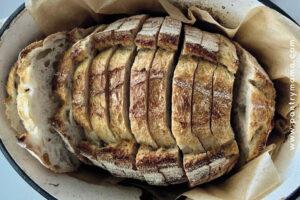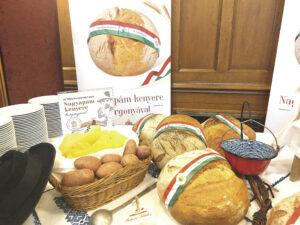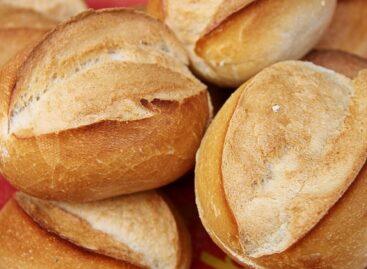Bread basket value
A drasztikus változásokat hozó válságévek után 2023-ban a sütőipar költségeinek növekedése lelassult, és ennek a tendenciának megfelelően alakultak a termékárak is. Az iparág körképünkben megkérdezett szereplői a minőségben és a termékfejlesztésben hisznek, és bizakodva tekintenek a jövőbe.
A cikk a Trade magazin 2024/8-9. lapszámában olvasható.

Dr. Zoltán Tóth
managing director
Lipóti Pékség
Zoltán Tóth, managing director of Lipóti:
“In 2023 we had to take into account two factors that were increasing our costs: one is the continuous rise in wages and the other is the newly introduced public heath product tax (NETA), which is now included in the price of the product as a separate tax. Many people wouldn’t think that the HUF 420 price of a smoked cheese croissant includes HUF 27.3 NETA and HUF 64.07 VAT”. Lipóti’s store number is growing by 8-10% year after year. The basket value of individual purchases is rising in forints due to inflation.

István Mikos
corporate director
Ceres
“In addition to the high quality of our products and the fact that they offer value for money, the strengthening health-conscious consumer segment is also playing a role in our innovation work. We also have to consider the growing number of single-person households when determining the size and format of our products”,
says István Mikos, corporate director of Ceres.
Modern bread must always be an essential element of modern nutrition, and the company’s innovations are always backed up by the latest research data available, which they use to analyse changing consumption habits.
Consumer-centric thinking

Klára Ludwig
founder-managing director
Jókenyér
Klára Ludwig, founder and managing director of JÓkenyér:
“After the drastic changes of the previous two years such as the growing energy, fuel and raw material prices, the weakening of the forint and the difficulties on the labour market, production costs in the baking industry consolidated in the second half of 2023 and in 2024, so there was no need to readjust prices”.
The company’s pricing is driven by the need to provide as many customers as possible with high quality, additive-free bakery products at affordable prices.

Sponsored illustration

Szilárd Kelemen
commercial director
Fornetti Group
“Thanks to our ability to adapt quickly, we have always passed on the cost increases to our consumers in good time, but only to the extent necessary. This consumer-centric thinking also explains why we aren’t changing the diversity of our product selection. Fornetti is the region’s most successful bakery company, serving one million customers a day”,
stresses Szilárd Kelemen, commercial director of the Fornetti Group.
More conscious consumers

Miklós Osztermayer
managing director, Hungary
Lantmannen
“Our costs have increased significantly in recent years for the well-known reasons, and the recent drop in energy and raw material prices is only enough to ensure that we don’t plan further price increases in the short term. As for our product selection, we have seen that the gap is narrowing between our standard and premium products. Consumers are buying more consciously: more often in smaller quantities, from special offers and in smaller sizes”,
explains Miklós Osztermayer, managing director of Lantmannen in Hungary.
They make products that meet new market needs: the Natur’A range is a new generation of breads.

Zoltán Matskási
marketing and
business development director
Pek-Snack
Zoltán Matskási, marketing and business development director of Pek-Snack:
“The past year was challenging for us too, but this year is different – we haven’t been forced to increase prices significantly. This is certainly a reason to be optimistic. However, the average basket value has decreased, as consumers are buying what is necessary and avoid luxury items. The frequency of purchases has also fallen, suggesting that shoppers are planning their purchases better”.
Adapting

Sarkadi Katalin
marketingvezető
Abonett
“Compared to the previous year, in 2023 there was less stress in the domains of raw material, packaging and energy costs. This basically meant that price volatility came to a halt and unit prices for the main cost items stabilised – albeit at a much higher level than before – making this financial year more predictable. At the same time the EPR charge was introduced. In 2024 packaging and paperboard prices are already up 10-15% compared to last year”,
informs Katalin Sarkadi, head of marketing at Abonett. Abonett product prices have only seen a minimal increase.
Zoltán Tóth added that every year Lipóti develops 15-20 products, from which 6-8 are introduced to the market after testing. Today there is a growing demand for sliced and packaged products.
“In Hungary wheat flour is the most popular and the breads made from it strongly dominate the Hungarian taste landscape, so using flours made from non-traditional grains such as rye and/or spelt wheat flour – or even the wholemeal versions of these – or enriching the dough with seeds could also be trendsetting”,
underlines Melinda Mórocz, head of marketing at JÓkenyér.

In Hungary, average consumption has now fallen to 50-52 kg per year
Appropriate responses
According to Szilárd Kelemen, there are more and more start-up ideas coming to the market, with street food, artisanal and traditional products finding their way and perhaps even being accepted by certain target groups. However, in market terms this isn’t yet a challenge for Fornetti.
Miklós Osztermayer told: they manufacture frozen products in order to reduce food waste – their retailer partners only have to bake the quantities they need. Lantmannen products don’t require any expertise to prepare in shops. The breads range consists of premium products, which basically determines the primary point of sale – super- and hypermarkets.
Zoltán Matskási points out that they view their special product range as a breakout point, with the Pek-Snack assortment also including low-carb products that give consumers the opportunity to snack without the feeling of guilt. However, the scope and success of innovations is limited, as nothing is going to knock the chocolate roll or the cottage cheese bag off the top of the popularity charts for a long time.
Katalin Sarkadi revealed that all Abonett products are free from additives and preservatives, and the company mainly uses locally sourced grains. They also work with trendy ingredients such as quinoa, lentils and green peas. //
What is the state of play?
Trade magazin asked József Septe, president of the Hungarian Baker Association about the current problems, the latest achievements and opportunities in the sector:

József Septe
president
Hungarian Baker Association
“The price of our most important raw material, flour, jumped to an irrationally high level in 2022, but by 2023 it stabilised, albeit at a higher level than before. The same trend was observed for energy prices, while labour costs continued to grow fast. Statistical data reveals that Hungarian bread consumption has fallen somewhat in recent years. While the average annual consumption used to be 72kg of bread and 10-12kg of pastries, it is now down at 50-52kg a year. Small bakeries have only one way to win customers: quality and flexibility to meet specific consumer needs. This includes using sourdough technology as widely as possible and adapting the product selection to consumer needs, e.g. gluten-free, low-carb, etc. The purchasing and pricing policies of the large retail chains put great pressure on small bakeries. An increasing share of their products comes from market players that regularly receive targeted subsidies. Importing frozen products is similarly detrimental to small bakeries. For bakers it would be an important step to diversify sales channels, such as starting online sales or opening and modernising speciality shops and mobile shops. The association has developed a proposal for a national support programme, which we submitted to the Ministry of Agriculture. Unfortunately, the development programme announced doesn’t support the development of a specialised network of production-related shops. Basically the sector has to stand on its own two feet”.//
Our best breads in 2024
Almost 100 products made by Hungarian-owned bakeries entered the 13th St Stephen’s Day Bread Competition organised by the Hungarian Bakers Association.

Balmaz Sütöde Kft. made the winning product, using a 12-hour traditional leavening process, four types of flour, salt, water, lard and boiled potatoes. In the innovative bread category the winner was another bread by the same company, made with jalapeño, cheddar and wild sourdough. //
Ancient grains on the map
The positive qualities of ancient grains – favourable nutritional value, unique flavour and the fact that they can be grown without using chemical pesticides – make them an important market opportunity for organic farmers. At the beginning of the summer the Hungarian Research Institute of Organic Agriculture presented a map of almost 60 locations where bakeries, mills and farms selling quality ancient wheat flour, bread and dough can be found. //
Related news
SIRHA Budapest 2026 – The biggest domestic celebration of the HoReCa sector
🎧 Hallgasd a cikket: Lejátszás Szünet Folytatás Leállítás Nyelv: Auto…
Read more >Pek-Snack: Peach donuts may be popular during Carnival – but Christmas was no longer just dominated by poppy seed bagels
🎧 Hallgasd a cikket: Lejátszás Szünet Folytatás Leállítás Nyelv: Auto…
Read more >Blue Planet: Ancient grains have more favorable physiological and environmental effects than industrially grown wheat
🎧 Hallgasd a cikket: Lejátszás Szünet Folytatás Leállítás Nyelv: Auto…
Read more >Related news
Hungarian beer magazine celebrates with rosé beer
🎧 Hallgasd a cikket: Lejátszás Szünet Folytatás Leállítás Nyelv: Auto…
Read more >(HU) Tortadíszítés-egyetem – A nap videója
🎧 Hallgasd a cikket: Lejátszás Szünet Folytatás Leállítás Nyelv: Auto…
Read more >(HU) Sajtburgermániások, ha mást esznek – A nap képe
🎧 Hallgasd a cikket: Lejátszás Szünet Folytatás Leállítás Nyelv: Auto…
Read more >







